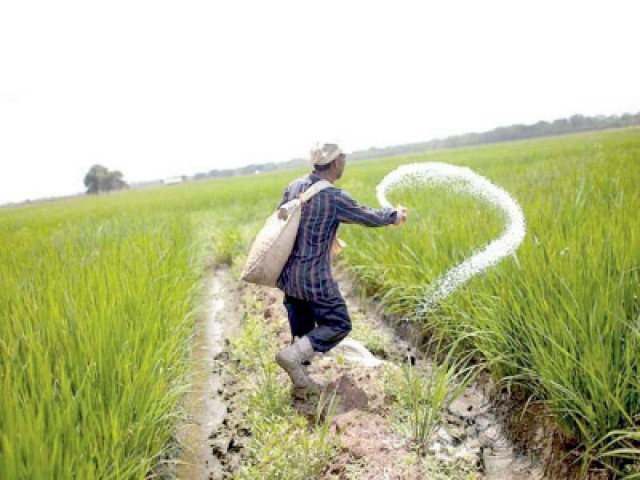Lack of data may impede urea subsidy
All provinces, excluding Punjab, have not digitalised land record

The plan of providing direct fertiliser subsidy to farmers may hit a snag as the existing database does not contain information about landholding along with the ownership status of growers.
During a recent meeting on fertiliser availability, parliamentarians stressed the need for offering targeted subsidy to farmers, who have long been deprived of the benefits of subsidies due to its indirect nature.
During the huddle, the secretary of the Ministry of National Food Security and Research pointed out that the Benazir Income Support Programme (BISP) had a national socio-economic registry covering poor families but a transparent disbursement mechanism was crucial.
It was decided that all-out efforts should be made to ensure urea import under a government-to-government (G2G) arrangement after exploring prices of commodities in the Black Sea region, Gulf states and China in order to ensure adequate supplies during the Kharif crop-sowing season.
It was also agreed that urea prices should be uniform and efforts should be made to persuade the industry to rationalise prices to ease pressure on the growers. Meeting participants noted that the development of a mechanism to provide targeted subsidies was time consuming and hence should be avoided during the ongoing Kharif sowing season.
Some participants apprehended that the existing database did not contain information about landholding along with the ownership status. Furthermore, land record has not been digitised in all provinces, with the exception of Punjab. It was stated that a reduction in urea prices through subsidies would not yield the desired results and they may not be passed on to the farmers.
Syed Khurshid Ahmad Shah, member National Assembly, emphasised that whenever the urea inventory was low, a black market would emerge and prices would start rising, leading to the exploitation of the farming community. He argued that buffer stocks were necessary for smooth availability and price stability in the market, especially during peak demand periods. Hence, timely urea import and gas supply to all plants were necessary to prevent such malpractices.
He stressed that land record should be computerised to provide targeted subsidies to the growers and the tax returns filed by them may be used as an instrument to determine the quantum of subsidy. MNA Fatehullah Khan Mian Khel pointed out that hoarding and profiteering were uncontrollable, which were badly impacting the poor farmers. He suggested a tax rebate system for the urea industry to bring down fertiliser prices.
Another MNA, Ahmad Raza Mancka, was of the view that urea prices should be around Rs4,000 per bag, considering the substantially low prices of wheat, maize and rice offered to the farmers.
Committee chairman stated that there was a significant distortion in gas prices for urea-producing plants. It was elaborated that the price of gas, a key input for urea production, for a few plants was around Rs780 per million British thermal units (mmBtu) while for other plants it is Rs1,597, which necessitated the announcement of a uniform gas price.
It was pointed out that the government was considering providing blended supplies (a mix of liquefied natural gas and indigenous gas) to two fertiliser plants, namely Fatima Fertiliser and Agritech, which would certainly have an impact on urea prices.
The chief of National Fertiliser Development Centre (NFDC), in a presentation, highlighted the terms of reference of a committee constituted by the Prime Minister’s Office. He briefly described the fertiliser production capacity in the country and the plant-wise urea production during 2023 and 2024.
He also presented the urea supply-demand situation for the current Kharif season, stating that June and July were critical because of peak demand and low inventory.
MNA Chaudhry Iftikhar Nazir posed a query about urea shortage and its black market faced by the farming community during the Rabi sowing season 2023-24. The NFDC chief explained that buffer stocks were less than 200,000 tonnes during peak demand in December and January in the Rabi season, which paved the way for profiteering and hoarding, leading to an artificial shortage.
The unavailability of buffer stocks was due to the late arrival of 220,000 tonnes of imported urea, which reached in the last week of December instead of September on account of financial crunch. Once the arrival of imported urea was completed, the next uphill task was to bridge the price difference between the international and domestic markets. Eventually, it was decided to hand over the imported urea to the local urea manufacturers and best practices were followed to manage the price difference.
At present, urea is sold for Rs4,400 per bag while di-ammonium phosphate (DAP) is available in the range of Rs9,500 to Rs9,800 per bag. The chairman asked the Ministry of Industries and Production secretary to convene a meeting with fertiliser manufacturers to discuss issues related to the supply chain.
The Ministry of Industries secretary told the meeting that after timely summing up the urea requirement, the approval for import of 200,000 tonnes had been sought from the cabinet. The Trading Corporation of Pakistan (TCP) was in negotiations with the suppliers from Turkmenistan for import on a G2G basis. He declared that the imported urea was expected to arrive in the last week of June 2024 and emphasised the need for taking into account the current inventory of about 180,000 tonnes lying with dealers.
He stressed that uninterrupted gas supply to all urea manufacturers had been ensured for the entire Kharif 2024 season. Fauji Fertiliser Bin Qasim Limited (FFBL) would also receive full gas supply, which would enhance urea production.
Published in The Express Tribune, June 9th, 2024.
Like Business on Facebook, follow @TribuneBiz on Twitter to stay informed and join in the conversation.



















COMMENTS
Comments are moderated and generally will be posted if they are on-topic and not abusive.
For more information, please see our Comments FAQ